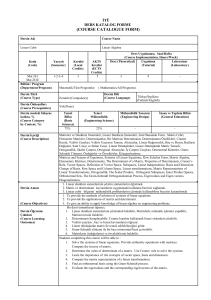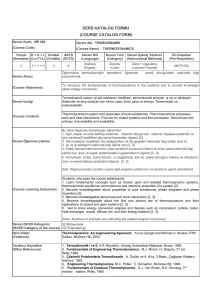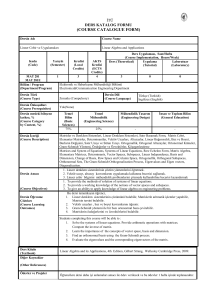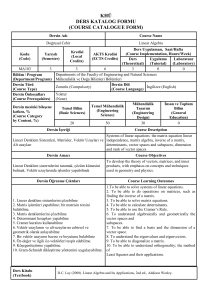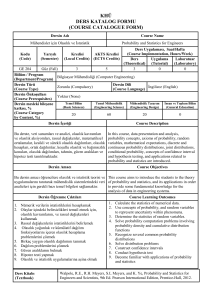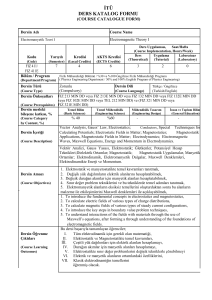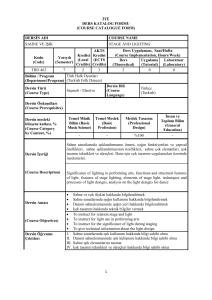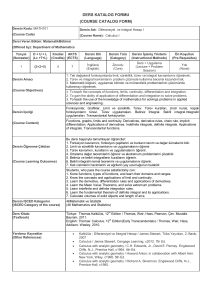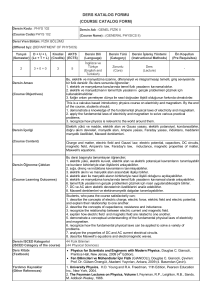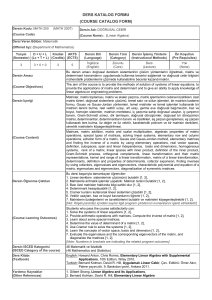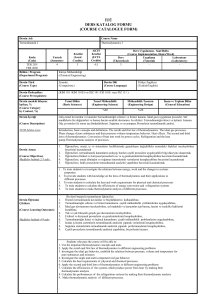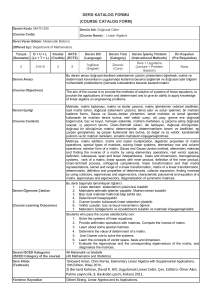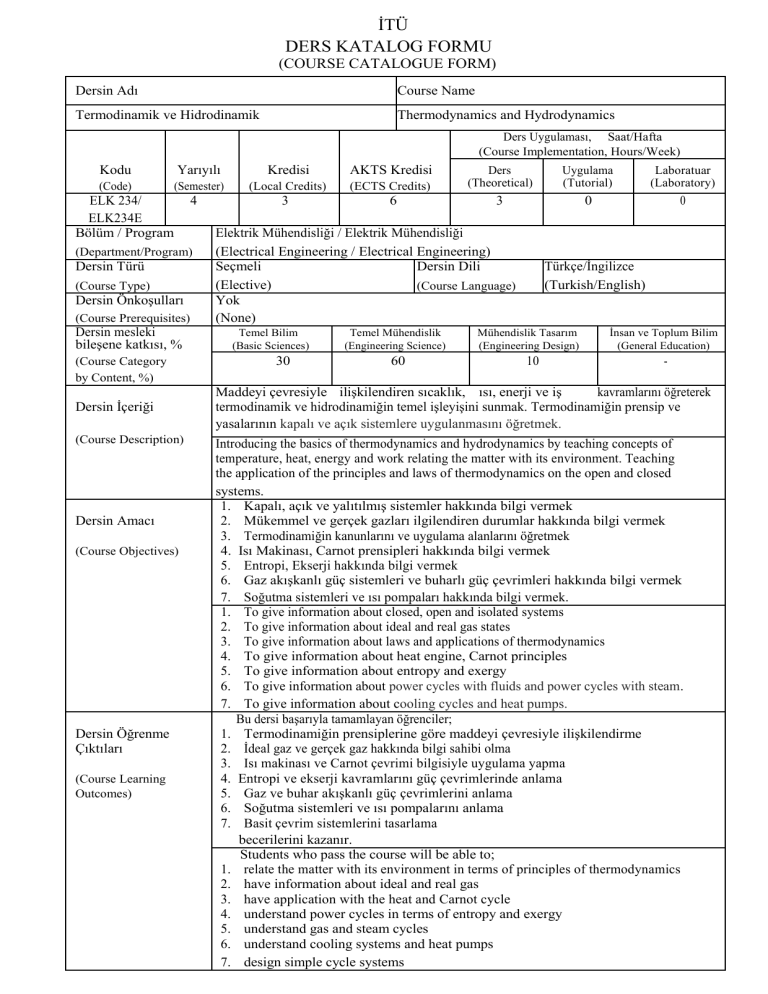
İTÜ
DERS KATALOG FORMU
(COURSE CATALOGUE FORM)
Dersin Adı
Course Name
Termodinamik ve Hidrodinamik
Thermodynamics and Hydrodynamics
Ders Uygulaması, Saat/Hafta
(Course Implementation, Hours/Week)
Kodu
Yarıyılı
Kredisi
AKTS Kredisi
(Code)
(Semester)
(Local Credits)
3
ELK 234/
ELK234E
Bölüm / Program
4
(Department/Program)
Dersin Türü
(Course Type)
Dersin Önkoşulları
(Course Prerequisites)
Dersin mesleki
bileşene katkısı, %
(Course Category
by Content, %)
Dersin İçeriği
(Course Description)
Dersin Amacı
(Course Objectives)
Dersin Öğrenme
Çıktıları
(Course Learning
Outcomes)
(ECTS Credits)
Ders
(Theoretical)
Uygulama
(Tutorial)
Laboratuar
(Laboratory)
6
3
0
0
Elektrik Mühendisliği / Elektrik Mühendisliği
(Electrical Engineering / Electrical Engineering)
Seçmeli
Dersin Dili
(Elective)
(Course Language)
Yok
(None)
Temel Bilim
(Basic Sciences)
30
Temel Mühendislik
(Engineering Science)
60
Türkçe/İngilizce
(Turkish/English)
Mühendislik Tasarım
(Engineering Design)
10
İnsan ve Toplum Bilim
(General Education)
-
Maddeyi çevresiyle ilişkilendiren sıcaklık, ısı, enerji ve iş
kavramlarını öğreterek
termodinamik ve hidrodinamiğin temel işleyişini sunmak. Termodinamiğin prensip ve
yasalarının kapalı ve açık sistemlere uygulanmasını öğretmek.
Introducing the basics of thermodynamics and hydrodynamics by teaching concepts of
temperature, heat, energy and work relating the matter with its environment. Teaching
the application of the principles and laws of thermodynamics on the open and closed
systems.
1. Kapalı, açık ve yalıtılmış sistemler hakkında bilgi vermek
2. Mükemmel ve gerçek gazları ilgilendiren durumlar hakkında bilgi vermek
3. Termodinamiğin kanunlarını ve uygulama alanlarını öğretmek
4. Isı Makinası, Carnot prensipleri hakkında bilgi vermek
5. Entropi, Ekserji hakkında bilgi vermek
6. Gaz akışkanlı güç sistemleri ve buharlı güç çevrimleri hakkında bilgi vermek
7. Soğutma sistemleri ve ısı pompaları hakkında bilgi vermek.
1. To give information about closed, open and isolated systems
2. To give information about ideal and real gas states
3. To give information about laws and applications of thermodynamics
4. To give information about heat engine, Carnot principles
5. To give information about entropy and exergy
6. To give information about power cycles with fluids and power cycles with steam.
7. To give information about cooling cycles and heat pumps.
Bu dersi başarıyla tamamlayan öğrenciler;
1. Termodinamiğin prensiplerine göre maddeyi çevresiyle ilişkilendirme
2. İdeal gaz ve gerçek gaz hakkında bilgi sahibi olma
3. Isı makinası ve Carnot çevrimi bilgisiyle uygulama yapma
4. Entropi ve ekserji kavramlarını güç çevrimlerinde anlama
5. Gaz ve buhar akışkanlı güç çevrimlerini anlama
6. Soğutma sistemleri ve ısı pompalarını anlama
7. Basit çevrim sistemlerini tasarlama
becerilerini kazanır.
Students who pass the course will be able to;
1. relate the matter with its environment in terms of principles of thermodynamics
2. have information about ideal and real gas
3. have application with the heat and Carnot cycle
4. understand power cycles in terms of entropy and exergy
5. understand gas and steam cycles
6. understand cooling systems and heat pumps
7. design simple cycle systems
Ders Kitabı
Ödevler ve Projeler
Y. A. Çengel ve M. A. Boles, “Thermodynamics: An Engineering Approach”,
McGraw Hill.
1. A. Öztürk ve A. Kılıç, "Çözümlü Problemlerle Termodinamik", Üçüncü
Yayımı, Çağlayan Kitapevi, (1993).
2. Ahmet Cansız, Lecture Notes.
2 Proje
(Homework & Projects)
2 Projects
Laboratuar Uygulamaları
-
(Laboratory Work)
-
Bilgisayar Kullanımı
Dersin ödev hazırlama kısmında bilgisayarlardan yararlanılır.
(Computer Use)
Students use the computers in solving homework problems.
Diğer Uygulamalar
-
(Other Activities)
-
Başarı Değerlendirme
Sistemi
Faaliyetler
(Activities)
Yıl İçi Sınavları
(Midterm Exams)
Kısa Sınavlar
(Quizzes)
Ödevler
(Homework)
Projeler
(Projects)
Dönem Ödevi/Projesi
(Term Paper/Project)
Laboratuar Uygulaması
(Laboratory Work)
Diğer Uygulamalar
(Other Activities)
Final Sınavı
(Final Exam)
(Textbook)
Diğer Kaynaklar
(Other References)
(Assessment Criteria)
Adedi
(Quantity)
1
Değerlendirmedeki Katkısı, %
(Effects on Grading, %)
25
2
20
2
15
1
40
DERS PLANI
Hafta
1
2
3
4
5
6
7
8
9
10
11
12
13
14
Konular
Termodinamiğin temel kavramları
Enerji dönüşümü ve enerji analizi
Saf maddenin özellikleri
Kapalı sistemlerin enerji analizi
Kontrol hacimleri için kütle ve enerji analizi
Termodinamiğin ikinci yasası
Entropi
Ekserji
Gaz akışkanlı güç çevrimleri
Buharlı ve birleşik güç çevrimleri
Soğutma çevrimleri
Termodinamik özellik bağıntıları
Gaz karışımları
Gaz buhar karışımları ve iklimlendirme
Dersin
Çıktıları
1, 3
1, 2
1, 2
1, 3
1, 3
1, 3, 4, 7
1, 3, 5
1, 3, 5
1, 2, 6
1, 6
1, 7
1, 3
1, 2, 6
1, 2, 6
COURSE PLAN
Weeks
1
2
3
4
5
6
7
8
9
10
11
12
13
14
Topics
Basic concepts of thermodynamics
Energy, energy transfer and energy analysis
Properties of pure substances
Energy analysis of closed systems
Mass and energy analysis of closed systems
Second law of thermodynamics
Entropy: A measure of disorder
Exergy: A measure of work potential
Gas power cycles
Vapor and combined power cycles
Refrigeration cycles
Thermodynamic property cycles
Gas mixtures
Gas-vapor mixture and air-conditioning
Course
Outcomes
1, 3
1, 2
1, 2
1, 3
1, 3
1, 3, 4, 7
1, 3, 5
1, 3, 5
1, 2, 6
1, 6
1, 7
1, 3
1, 2, 6
1, 2, 6
Dersin Elektrik Mühendisliği Programıyla İlişkisi
Programın mezuna kazandıracağı bilgi ve beceriler (programa ait çıktılar)
a
b
c
d
e
f
g
h
i
j
k
l
Matematik, bilim ve mühendislik bilgilerini uygulama becerisi
Uygun sonuçlara ulaşmak üzere verileri analiz etmek ve yorumlamak kadar elektrik
mühendisliği ile ilgili deneyler tasarlama ve yürütme becerisi
İstenen gereksinimleri karşılamak üzere bir elektrik sistemi, bileşeni veya işlemini
tasarlama becerisi
Çok disiplinli ekiplerde çalışma becerisi
Elektrik mühendisliği problemlerini tanımlama, formüle etme ve çözme becerisi
Profesyonel ve etik sorumlulukları anlaşılması
Sözlü ve yazılı ortamlarda etkin iletişim becerisi
Mühendislik çözümlerinin küresel ve sosyal çerçevedeki etkilerini anlamak için gerekli
kapsamlı eğitim
Yaşam boyu öğrenme ihtiyacının tanımlanması ve sürdürme becerisi
Çağdaş konular ve bunların mühendislik alanındaki etkileri hakkında bilgi edinme
Elektrik mühendisliği uygulamaları için gerekli teknikleri, becerileri ve modernn
mühendislik araçlarını kullanma becerisi
Elektrik mühendisliği uygulamaları için karmaşık sistemleri tasarlamak ve analiz etmek
için uygulamalı elektronik, bilgisayar ve bilişim sistemleri hakkında bilgi edinme
Katkı
Seviyesi
1 2
3
X
X
X
X
X
X
X
X
X
1: Az, 2: Kısmi, 3: Tam
Relationship between the Course and Electrical Engineering Curriculum
Program Outcomes
a
b
c
d
e
f
g
h
i
j
k
l
an ability to apply knowledge of mathematics, science, and engineering
an ability to design and conduct experiments in electrical engineering, as well as to
analyze and interpret data to reach an appropriate conclusion
an ability to design an electrical system, component, or process to meet desired needs
an ability to function on multi-disciplinary teams
an ability to identify, formulate, and solve electrical engineering problems
an understanding of professional and ethical responsibility
an ability to communicate effectively in both oral and written fashion
the broad education necessary to understand the impact of engineering solutions in a
global and societal context
a recognition of the need for, and an ability to engage in life-long learning
a knowledge of contemporary issues and their impact on engineering profession
an ability to use the techniques, skills, and modern engineering tools necessary for
electrical engineering practice
a knowledge of applied electronics, computer and information systems to design and
analyze complex systems for electrical engineering applications
Level of
Contribution
1 2
3
X
X
X
X
X
X
X
X
X
1: Little, 2: Partial, 3: Full
Düzenleyen (Prepared by)
Tarih (Date)
30.01.2014
İmza (Signature)

